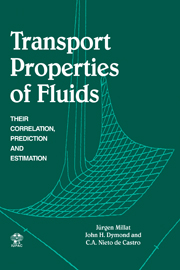Book contents
2 - Technological Importance
Published online by Cambridge University Press: 07 October 2009
Summary
Introduction
Fluids, that is gases and liquids, are self–evidently prerequisites for normal life. They also play a major role in the production of many artefacts and in the operation of much of the equipment upon which modern life depends. Occasionally, a fluid is the ultimate result of a technological process, such as a liquid or gaseous fuel, so that its existence impinges directly on the public consciousness. More often, fluids are intermediates in processes yielding solid materials or objects, and are then contained within solid objects so that their public image is very much less and their significance not fully appreciated. Nevertheless, every single component of modern life relies upon a fluid at some point and therefore upon our understanding of the fluid state.
The gross behavioral features of a fluid are well understood in the sense that it is easy to grasp that a gas has the property to completely fill any container and that a liquid can be made to flow by the imposition of a very small force. However, beyond these qualitative features lie a wide range of thermophysical and thermochemical properties of fluids that determine their response to external stimuli. This analysis concentrates exclusively on thermophysical properties and will not consider any process that involves a change to the molecular entities that comprise the fluid.
- Type
- Chapter
- Information
- Transport Properties of FluidsTheir Correlation, Prediction and Estimation, pp. 6 - 16Publisher: Cambridge University PressPrint publication year: 1996



